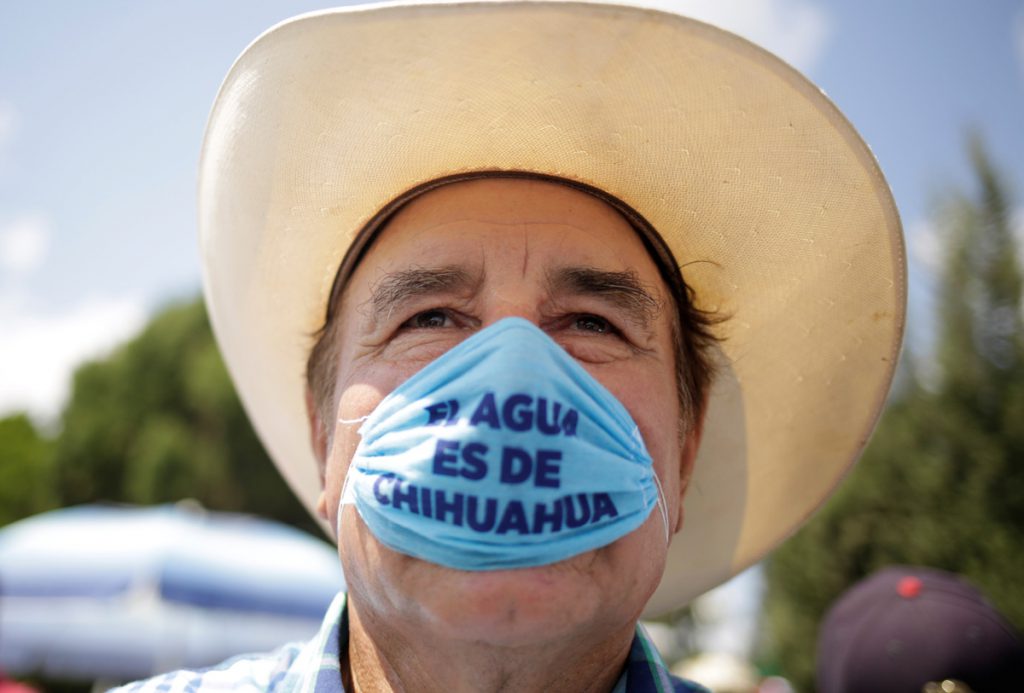Have you ever wondered what you would do without water? Water is indeed life. And without access to clean water, life’s hardships become further amplified. For many people in the US, water is a resource that they take for granted as it reliably flows through our fingers when we open a faucet in the kitchen or bathroom. Despite nearly 71% of the earth covered by water, large segments of people have little to no access to water. Recently, farmers in Chihuahua, Mexico, realized the precarious situation they found themselves in while enduring the drought at the same time that impending water payments were due because of a treaty with the United States that intended to promote water security in both countries. Mexican farmers faced with the harsh reality that they might not have water for their next harvest. The idea of this possibility prompted farmers and other citizens around the state to protest by blocking highways and showing up at dams. Tensions between the Mexican government and its constituents reached an all-time high when a protester was killed on September 8, 2020 by a Mexican national guard. So, how did the fight over water turn deadly?

To understand the severity of the issue, one must first go back to the ratification of the water treaty between the two countries. In 1944 The United States of America and Mexico signed the treaty “Utilization of Waters of the Colorado and Tijuana Rivers and of The Rio Grande”. This treaty was created to ensure the water security of both countries through the sending of water between each country.1 Every year the United States sends nearly 489 billion gallons of water from the Colorado River to their neighbor Mexico. Unfortunately, Chihuahua receives little to no water from this treaty. Most of the water sent by the United States is delivered to bordering states such as Nuevo Leon and Tamaulipas. Moreover, while they receive a small portion of the United States’ water payments, the state of Chihuahua sends more than half of the 114 billion gallons Mexico sends to the US each year. This has burdened the farmers of Chihuahua in recent years as they try to irrigate their own crops.2 Chihuahua is home to the biggest production of nuts and chilies in Mexico. In fact, Chihuahua produced 79,934 metric tons worth of pecans in 2015. This accounted for 65% of all pecan production in Mexico. when one considers that pecan trees require an estimated 34,000 gallons per year, it is easy to see why Chihuahua needs to retain as much water as they can in their dams for their farmers.3

Still, in 2020, Mexico fell behind in its payments to fulfill the requirements of the treaty of 1944. The country reportedly owes 345,600 acre-feet of water which is due by October 24th. This deficit accounts for 88% of what Mexico owes within the five-year quota. The President of Mexico, Andrés Manuel López Obrador, wants to make the payment and is relying heavily on Chihuahua to deliver most of that payment through its dams. As he sees it, it is in the best interest of the country to make the payment, since the United States sends more water to Mexico than Mexico sends back. The Mexican President also fears that President Trump will impose tariffs on Mexican products if Mexico fails to meet the requirements set forth by the treaty.4 However, Chihuahuan farmers know the effect the payment would have on their livelihoods. The transfer of the water Mexico owes to the United States would drastically decrease the water levels within Chihuahua, which would result in an exponential decrease in production as well. Fearing the future implications that the fulfillment of the treaty would have on their farms, Chihuahuan residents decided it was time to take a stand.5
Since the start of the year, Mexicans have been protesting the decision to pay for the treaty with Chihuahua’s limited water resources but the biggest protest came in September. In September, 2,000 farmers marched up to the dam name La Boquilla after hearing that the Mexican government had diverted increments of water to the United States instead of meeting the agreements it had with the farmers.6 Protesters were able to gain control of the dam when they overpowered law enforcement. As the news broke about the protest, the Mexican National Guard was deployed to La Boquilla Dam. Farmers first tried to dialogue and to preserve this resource, but they soon started feeling as though their needs were not being heard and escalating into violence. Confrontations between the two parties became more violent as farmers started setting fire on the dam’s infrastructure and damaging police vehicles in hopes that it would send a message to the government or gain more recognition from the media. Amidst all the commotion of the protest, a national guard shot and killed a woman protester and severely injured her significant other. Jessica Estrella Silva Zamarripa was the daughter of pecan farmers and the mother to three children. She was bravely fighting for her human right to water when she was killed. Her death shed a light on the issue of water distribution and has become a source of motivation from people all over Mexico.7

Meanwhile, President Andrès Manuel Lòpez Obrador attempted to downplay the protests and the severity of the issue. He went on record stating the protests had been staged by his political opposition.8 In a press conference, the President named 17 politicians who he says funded the fake protests. Andrès Manuel Lòpez Obrador has also attempted to gain more support from the Mexican population at large by stating he will request for the United Nations to complete a study to ensure that the United States is actually sending the amount of water that they say they are sending. Moreover, the President of Mexico assured his constituents that he will take matters into his own hands, saying he will personally appeal to the President of the United States to renegotiate the amount that Mexico owes or at least the terms by which that payment is made.9
With low rainfall and a large water debt payment looming, the Mexican government faced a dilemma. On one hand, the Mexican government wanted to keep good diplomatic ties with its neighboring country. Failure to make the payment could potentially result in sanctions on Mexican goods, which would affect more than the agricultural production of Chihuahua. On the other hand, if the payment of the water owed was made, President Andrès Manuel Lòpez Obrador could further alienate the people of Chihuahua. The transfer of the 345,600 acre-feet of water to the United States would leave Chihuahuans unable to water their crops for the following season. The President’s negligence regarding the issues provoked protests all over the State of Chihuahua against the violation of their human rights to preserving their water, their crops, and their lives.
Finally, on October 22, 2020, two days before the deadline for the water payment, Mexico and the United States reached an agreement that would account for the 345,600 acre-feet of water that was owed. The last-minute deal would hand over the rights of Mexico’s share of the water from the Amistad and Falcon dams to the United States. The terms of the agreement would reportedly spare Chihuahua with enough water for the next farming season. The deal would also implement “workgroups to analyze and develop water management tools to provide for increased reliability and predictability in Rio Grande water deliveries to users in the United States and Mexico”.10 While Mexico was able to fulfill the treaty requirements, it came at a huge cost to the country. Ultimately, the potential risk of water insecurity in the state of Chihuahua cost Mexico thousands of dollars worth of infrastructural damage plus the loss of life for one of its citizens, a young mother.
- “Utilization of Waters of the Colorado and Tijuana Rivers and of the Rio Grande” Accessed October 16, 2020, https://www.usbr.gov/lc/region/pao/pdfiles/mextrety.pdf. ↵
- Pamela Constable, “Mexican Farmers Occupy Dam to Stop Water Payments to the United States” Washington Post, https://www.washingtonpost.com/world/the_americas/us-mexico-water-dam-farm-protest/2020/09/13/dddb85e8-f3bb-11ea-999c-67ff7bf6a9d2_story.html, Accessed October 16, 2020. ↵
- Julio López-Díaz, “The Pecan Industry in Chihuahua Mexico: Challenges and Successes,” https://aces.nmsu.edu/ces/pecans/documents/9%20Lopez%20Diaz.pdf. ↵
- Mark Stevenson, “Mexico Struggles with U.S. Water Debt, Suggests U, N, Audit,” September 3, 2020, https://www.pbs.org/newshour/politics/mexico-struggles-with-u-s-water-debt-suggests-u-n-audit, Accessed October 16, 2020. ↵
- Pamela Constable, “Mexican Farmers Occupy Dam to Stop Water Payments to the United States” Washington Post, https://www.washingtonpost.com/world/the_americas/us-mexico-water-dam-farm-protest/2020/09/13/dddb85e8-f3bb-11ea-999c-67ff7bf6a9d2_story.html, Accessed October 16, 2020. ↵
- Mexico News Daily. “National Guard Backs off after Tear Gas Fails to Dislodge Chihuahua Farmers,” September 9, 2020. ↵
- Pamela Constable, “Mexican Farmers Occupy Dam to Stop Water Payments to the United States” Washington Post,https://www.washingtonpost.com/world/the_americas/us-mexico-water-dam-farm-protest/2020/09/13/dddb85e8-f3bb-11ea-999c-67ff7bf6a9d2_story.html, Accessed October 16, 2020. ↵
- Eoin, Wilson, “Mexico’s Water Crisis Heats up as Transfer to US Looms”, https://www.aljazeera.com/news/2020/10/8/mexico-water-crisis-heats-up-as-us-transfer-deadline-looms, Accessed November 2, 2020. ↵
- Patrick McDonnell, “Mexican Water Wars: Dam Seized, Troops Deployed, at Least One Killed in Protests about Sharing with US”, https://www.latimes.com/world-nation/story/2020-09-11/mexican-water-wars-dam-seized-troops-summoned-at-least-one-killed-in-dispute-about-water-sharing-with-u-s September 12, 2020. ↵
- Mark Stevenson, “Mexico Reaches Deal to Pay Water Debt to US”, https://abcnews.go.com/International/wireStory/mexico-reaches-deal-pay-water-debt-us-73768266, Accessed November 9, 2020. ↵



68 comments
Vivian Urrutia
This article reminded me a lot of the situation happening back home. I live in the capital city of Honduras which is name Tegucigalpa. in my city water has been extremely limited the past year and in my third world country, a situation like this is a disaster. Like people in Chihuahua, farmers were having trouble with their crops and began to ask the government for money with protests. the situation I was living in my country and this article really opened up my eyes about how we don’t value basic things that we think will always be there like water. The article was so well described and structured that helped me a picture when I was living in Honduras very clearly.
Maria Moreno
I understand that the Mexican government wants to keep good diplomatic ties with its neighboring country, But I do not think that it Should be at the cost of his own people. I am no politic, And I do not know about this Treaty enough to talk about it but Sadly water is a limited resource, And if we don’t take care of it We will be facing more issues like these in the coming-up years. I really liked your article Andres, Thanks for giving a voice to the people of Chihuahua.
Tiana Trejo
Great introduction! Andres led me to begin thinking of water security and then connected the matter to his subject. I was unaware of the agreement between the U.S. and Mexico to help secure water, and it was stunning to realize that in the midst of all the water we transfer to Mexico, Chihuahua has been largely neglected. This story highlighted the dilemma Mexico faced- was it more important to tend to the relationship with the U.S., or stand by their own farmers in Chihuahua?
Karla Cardenas
I had an idea of this happening due to being Mexican-American and having family living there, however, I wasn’t aware of the extent of the issue. The article was amazingly detailed that help brings light to the issue that anyone can understand. The issue itself always seemed too complex to understand but this article really helped in understanding it better.
Juan Asfura
I find this article to be very informative and it helps me understand how people really suffer with water and their rights. Back Home in Honduras, things are similar than in Chihuahua and like this problem is in not getting attention and at the end of the day people need water to survive and it is needed for their crops in order to make a living. It is also interesting how the United States is involved and how everything was handle with the treaty.
Marian Reyes
The way this article is structured really shows the complexity of the situation and why this issue is so important. The message you are conveying is probably one of the most important out there: water really is life. Water is needed for just about every aspect necessary for life and the fact that it is being threatened for an entire state is concerning.
Rhys Kennedy
This was simultaneously a very well done, informative article while also imbuing a powerful message. This is a story that I have never heard before, and what shocks me the most is how long this has been an issue. It is astonishing that despite going on for several decades, that it has taken till now for the government to try and fully address the voices of the farmers and people.
Paul Garza
Wow! This was such an informative and relevant article! I have never in all my years as a Mexican American in Texas heard of this treaty between Mexico and the US. I am not so surprised that the farmers/ people of Chihuaha are not truly being heard. Instead, their movement and protest is seen an political. This situation only perpetuates that cycle throughout history that displaces and harms people with less power due to oppressive systems.
Madelynn Vasquez
Thank you for bringing light to this issue, Andres! I had no clue that this was going on in Mexico, makes you wonder if we could see similarities in events somewhere else? The recent winter storms that were just going on here in Texas, makes you realize how much we rely on water and power and how much we also rely on our leaders to efficiently lead us through crises.
Victor Rodriguez
Andres, this was a wonderful article to read about! I am from Chihuahua and I was aware of that challenge that the state is facing. Water is a critical resource to humans and based on many principles it should be considered a human right. It is a basic need for all people and I genuinely believe that any basic need is part of those inalienable rights all people are born with. Therefore, I believe that Mexican legislators and officials should have this issue as a priority and something they should worry about fixing very soon. It is amazing to see how many of the nations in transition have that problem.